AI (artificial intelligence) is quickly becoming an essential tool in marketing and content creation since it helps bloggers and website owners be a lot more productive.
However, with so many people creating content with the help of AI, how will it affect SEO?
As the president of one of the most popular SEO toolkits for WordPress, I’ve been closely observing and analyzing the impact of AI content on search engine rankings.
In this article, I will answer whether AI content is bad for SEO and share some insights and tips on using AI to your advantage.
Note: This is a guest post by Benjamin Rojas, the president of All in One SEO, the best WordPress SEO plugin on the market. This is an expert column that we publish every Thursday, where we invite a WordPress expert to share their experiences with our readers.
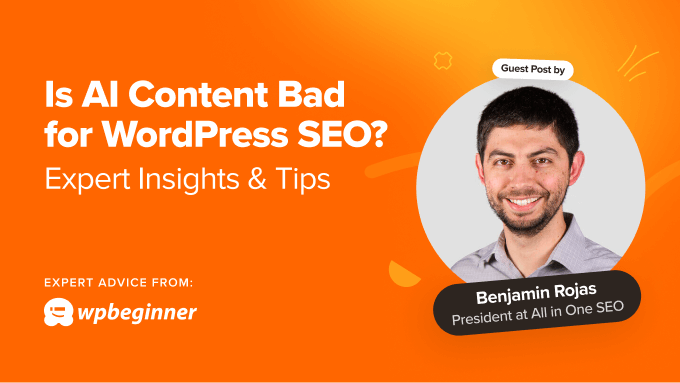
I will cover a few different topics in this post, and you can use the quick links below to jump to the section you want to read:
What Is AI Content?
AI content means text, images, videos, and other forms of content that are created by using an artificial intelligence tool like ChatGPT, Google’s Gemini, DALL-E, Microsoft Copilot, and more.
AI tools like ChatGPT and Google’s Gemini make it super easy to generate entire articles and essays in just minutes.
Similarly, AI image-generation tools like DALL-E, Midjourney, Firefly, and more can generate visual artwork for your website or blog.
All of these AI tools make it very easy for content creators to make new content on almost any topic under the sun much more quickly than they could before.
Now, before I explain how good or bad this content is for SEO, I want to talk about how AIs generate the content.
How Does AI Generate Content?
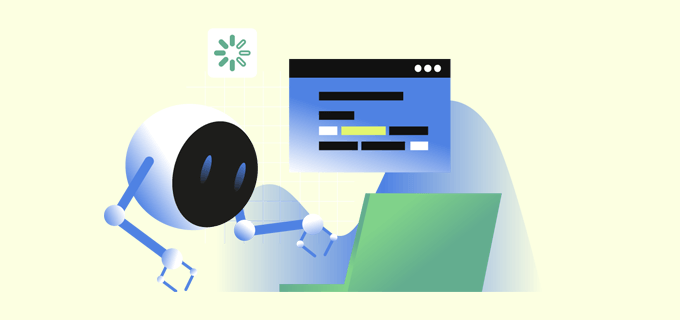
AI tools like ChatGPT, Gemini, Copilot, and others are advanced software trained using a technique called ‘Machine Learning’.
This technique involves feeding AI models lots of data from various sources, including websites, books, magazines, and other sources.
Unfortunately, the vast amount of data used for training AIs is not always factually correct, creative, coherent, or even good.
Developers try to address this by providing better quality data and teaching AIs to assign weightage scores to different data sources. However, AIs can still learn from incorrect, incoherent, and low-quality sources of information.
They are also trained in pattern recognition, which can sometimes lead to an AI condition called hallucination, where the AI could make up its own facts.
That’s why I always recommend double-checking any information generated by AI software because it could be inaccurate. And publishing false information on your WordPress website or blog could make your brand look unprofessional and even hurt your SEO.
Is AI-Generated Content Bad for SEO?
In an earlier guest column, I explained Google’s E-E-A-T guidelines for search.
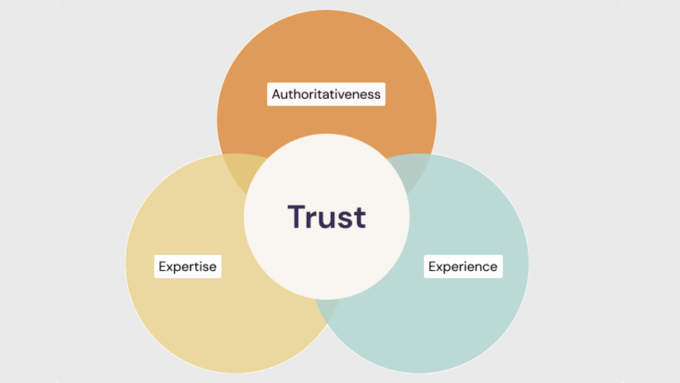
E-E-A-T stands for:
- Expertise
- Experience
- Authoritativeness
- Trustworthiness
Essentially, you will need to meet all of these criteria within your content to be ranked high on the search engine results pages (SERPs) in Google.
Content that is entirely generated by AI may not be able to satisfy these ranking signals for several reasons.
First, AI programs are trained on data from various sources. These sources don’t reflect your ‘Experience’ and ‘Expertise’ as the author because they are coming from third-party sites.
That’s why I always advise my customers to include their firsthand experiences within their online content.
Secondly, you need to consider the ‘Trustworthiness’ of information provided by AI. AI-generated content is not always accurate, could reflect bias, and can even make up things.
Lastly, AI cannot show the authoritativeness of a human author who has gained acknowledgment, earned credibility, and has the credentials to be an authority on a subject matter.
Does this mean that AI content is against Google Search guidelines?
The short answer is no, and here is what Google has to say about that:
Appropriate use of AI or automation is not against our guidelines. This means that it is not used to generate content primarily to manipulate search rankings, which is against our spam policies.
Google Search Guidelines on AI Usage
Google will not be punishing websites for using AI content. However, if AI and automation tools are used solely to manipulate search rankings, then that violates their spam policies.
This means that content entirely generated by AI may not be as good for SEO on its own.
It is missing one very important element: the human factor.
How to Create SEO-Friendly AI Content
In my opinion, it would be unwise to avoid using AI in your content creation process. That’s because it offers plenty of benefits, such as:
- Reducing the amount of time you would spend on research.
- Helping you come up with quick ideas or a solid outline for your content.
- Overcoming writer’s block by letting AI give up a few samples to use as a starting point.
But to make this content actually good for SEO, you will need to use AI as an assistant rather than a content generator.
This allows you to add your experience and authority to the content while still using AI to do the same work but more quickly and efficiently.
I recommend using AI in your content creation process in the following ways:
- Generate article ideas.
- Create article outlines and let AI help you fill the content gaps.
- Proofreading, paraphrasing, adjusting style and tone of content.
- Let AI work on portions of content to extend, summarize, or optimize your work.
To summarize, adding your human experience and expertise can make AI content good for SEO.
With this in mind, I will now provide some practical examples of using AI tools to achieve this.
1. Using AI to Generate Headlines
Did you know that 4 out of 5 people will not click on your website even when it appears on the first page of search results?
Headlines or SEO titles help your article gain more clicks in search results. This is what your users will first see when they are looking for content in Google.
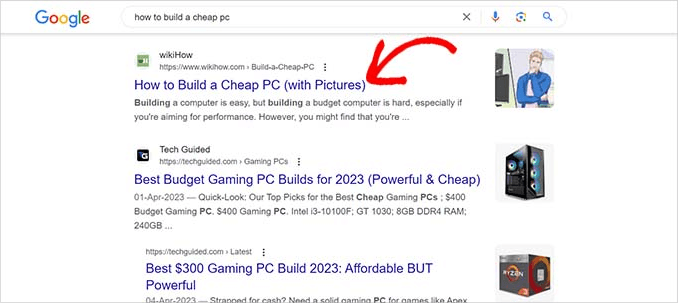
However, for your content to stand out, it will need to have an eye-catching and descriptive title.
There is a character limit for SEO titles, plus your competitors may already be using the most obvious headlines. This makes it difficult to write a powerful headline that entices users to click on it.
Luckily, this is where AI can help.
Because AI programs are remarkably good at recognizing and generating patterns, they can help you generate several excellent ideas at once.
For instance, you can use All in One SEO, which includes a built-in AI title generator. It uses OpenAI’s ChatGPT to generate highly engaging headlines.
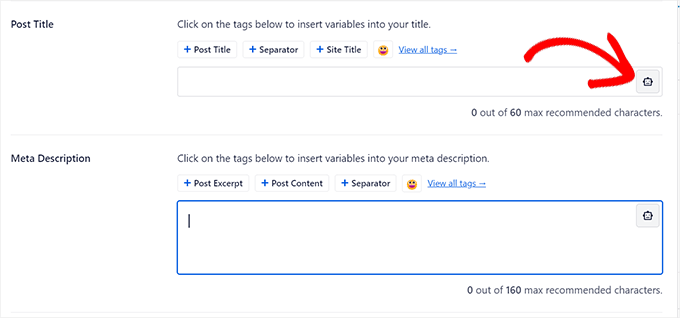
Note: You will need the premium version of OpenAI and integrate it with the AIOSEO plugin to use this feature.
Simply click on the bot icon next to the ‘Post Title’, and it will generate up to five ideas. They all automatically use the most up-to-date best practices for writing effective headlines.
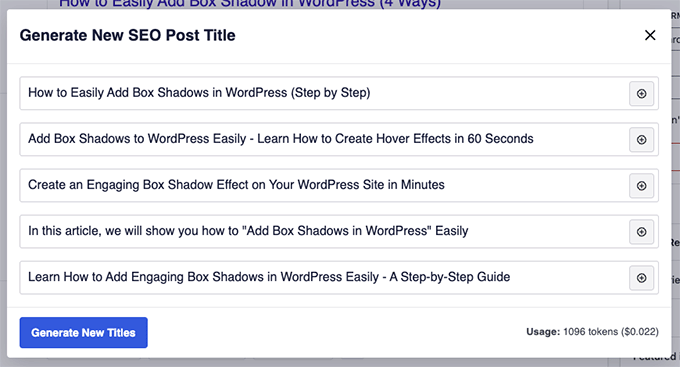
You can then pick one of the titles that would work best for your article or generate new titles until you find one that you like.
Similarly, you can use the same feature to write an SEO meta description as well.
Alternative tools: Headline Analyzer | Semrush AI Text Generator
2. Using AI Tools to Adjust Tone and Style
One of the biggest mistakes that website owners and bloggers make is not fully understanding their intended audience when creating content.
AI tools can help you get this right.
These tools have spent countless hours and have learned from millions of gigabytes of data. They are incredibly talented in understanding language patterns.
For example, you could use Grammarly to adjust your content for your target audience. It comes with an AI-powered writing assistant, which allows you to choose the tone and style of your content.
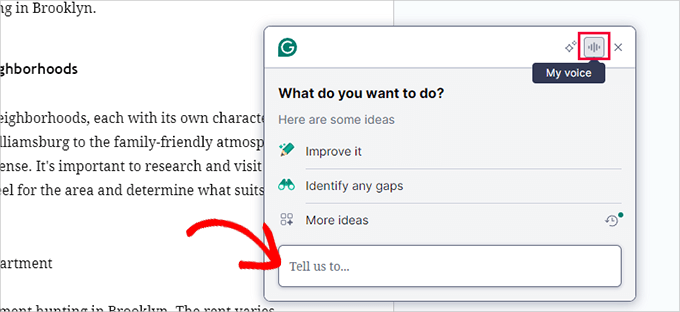
Simply click on the Grammarly icon on the screen, then write a prompt like ‘I want you to make suggestions to make the content sound more persuasive’.
Grammarly learns from your tone and style as you continue to use it. Then, it will identify your brand ‘voice’ and show you the results.
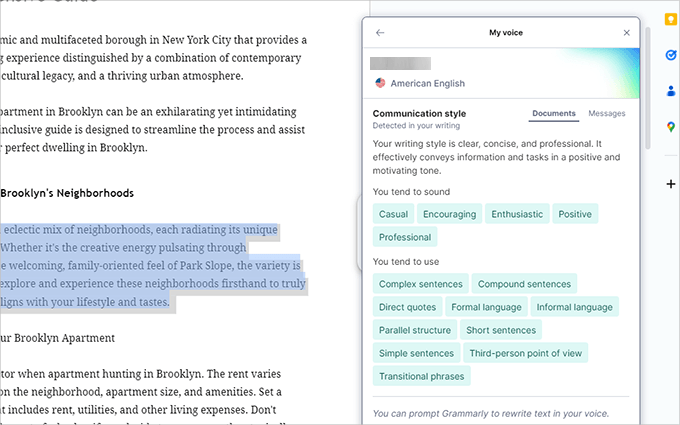
You can also instruct Grammarly to rewrite any text in your voice by simply selecting the text and typing the prompt ‘Rewrite in my voice.’
Alternatively, you could also use ChatGPT or Gemini to do something similar. Here is a quick prompt you can try:
I need you to act as a professional proofreader and experienced copywriter. First, you will ask me to provide you with the text that I want to optimize. Once you have received the text, instead of answering, you will then ask me to describe the tone and style I would prefer for the text. After I provide you with tone and style input, you will then analyze the text and make changes to it so that it matches the desired tone and style. You will highlight the changes you have made. Show a summary at the end describing what kind of tone and style the original text had and what changes you made to make it match the style and tone I asked for.
I also find this handy list of useful ChatGPT prompts quite helpful. It has some great prompt writing examples for bloggers, writers, and marketers.
3. Optimizing Content Using AI
In most industries, your content will be competing with other top articles, blog posts, and pages for search rankings.
Search engines look for the most helpful content for a user’s search intent and rank it accordingly.
But how do you know if your content addresses the user intent while being the absolutely best resource for that keyword?
This is another area where AI can help. Its powerful capability to quickly analyze patterns can help you find the missing pieces in your content.
AI platforms like ChatGPT or Gemini can help you compare your draft and make suggestions for inclusion.
For example, here is a prompt that I find works well with ChatGPT 4 and Gemini:
Ask me to provide you with the text of an article I am working on. After receiving the text, ask me to provide you with a search term I am trying to target. After receiving the search term, compare my text to the top 10 search results for the search term I provided. Now, I need you to make suggestions to fill in the content gaps in the text to make it better than the current top 10 search results.
For more specific tools, you could try Clearscope.
It is an AI-powered content optimization software that helps you optimize your content to the next level.
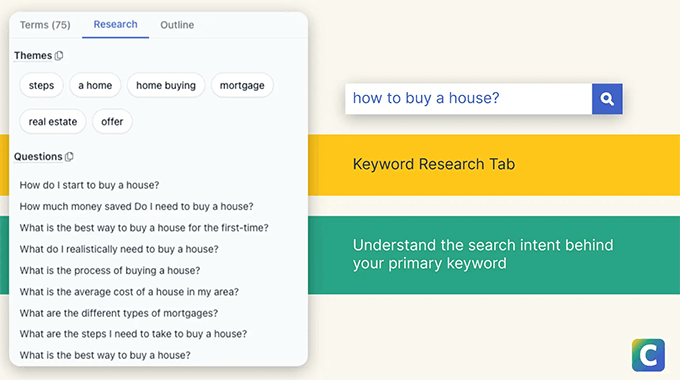
It uses AI to compare other top-ranking content for a keyword. It can generate an outline, find the questions people are looking for, and more.
You can also paste your content, and it will show you a score and missing keywords and phrases you can add to improve it.
In fact, my own team often uses it to optimize our blog content for search engines.
Conclusion: Is AI Content Good for SEO?
Overall, AI content is not bad for SEO, as long as you are providing your human input. That’s because any content generated entirely with AI does not reflect your unique perspective, experiences, and expertise, so it could harm your website’s SEO.
In my experience working daily with SEO best practices, I have seen firsthand the ever-evolving landscape of search engine optimization and the rising importance of AI.
That’s why I recommend using AI as an assistant tool in your workflow to help you create better content more quickly. However, it should not be a complete replacement for your own voice and content.
I hope this article answered some of your questions about whether AI content is bad for SEO. You may also want to look at these tools for using AI in WordPress SEO or check out expert tips on using AI in marketing.
If you liked this article, then please subscribe to our YouTube Channel for WordPress video tutorials. You can also find us on Twitter and Facebook.
The post Is AI Content Bad for WordPress SEO? (Expert Insights & Tips) first appeared on WPBeginner.
from WPBeginner https://ift.tt/urN1q80




0 Comments